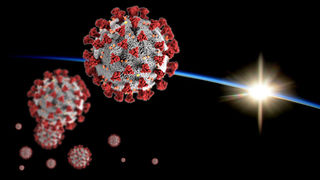Coronavirus Disease 2019
How to Stop the Pandemic From Infecting Your Thinking
Brace for impact! COVID-19-related fantasies and frauds are sweeping the globe.
Posted April 17, 2020 Reviewed by Ekua Hagan

The COVID-19 pandemic threatens more than our physical bodies. It presents a clear and present danger to our ability to analyze claims and make rational decisions. A human mind is a half-crazed cyclone of irrationality in the best of times, and now we are living in an environment of heightened confusion and anxiety. These are optimal conditions for bad thinking and dangerous beliefs to flourish.
In the coming months, an avalanche of pandemic-related fantasies, lies, and medical fraud will continue to swarm the globe. There will be no limit to the absurdity and cruelty of bad information coming. Prepare to think well or prepare to be a victim, because poor thinking skills can cost you time, money, dignity, good health, maybe even your life.
Fear makes the subconscious mind lean into lies that come disguised as hope. Desperation sweetens the allure of medical quackery. Neither politicians, editors, journalists, nor well-meaning friends and family members can shield you from all of it. Some of the nonsense and deceit will get through.
"Many people would rather die than think—in fact, they do." —Bertrand Russell
Good thinking throughout this pandemic will rest on performance rather than credentials. Being well-educated is not enough. This is about cognitive clarity, agility, and dynamism. What we all need is the dedication to a form of intellectual due diligence. We have to do the work necessary to determine what is worth knowing and accepting as most likely to be true.
When confronted with COVID-19 claims, we need to assess the credibility and expertise of sources. We must demand evidence and always value the scientific process. Perhaps most importantly, we have to be mature enough to withhold our belief or acceptance when a clear verdict just isn't available. "Might be true" should not equate to "is true" in your mind, especially with matters of health.
With so many people at home during the pandemic, social media platforms are enjoying a reprieve from criticism over privacy and deception issues. But while they are great for helping us maintain human connections, they also continue to be a pipeline of misinformation, pseudoscience, and medical fraud. Be alert to this, and don't help spread false claims. Use the technology; don't let the technology use you.
Think before you accept claims about a medical product or treatment. Has it been proven safe and effective by running the gauntlet of scientific study? Given the power of our subconscious biases, claims we want to be true require extra doubt and scrutiny. A few tips:
- A description of "natural" does not mean a treatment or preventative measure is necessarily safe and effective.
- Stories (anecdotal evidence) are not good enough to gamble your health. We are a story-telling species and a good one can entrance us well enough to try or buy almost anything. Remember this vulnerability when you hear tales of a miracle cure that allegedly helped many strangers or one close friend.
- Conspiracy theories (5G towers, "Bill Gates did it," "It's all a hoax") are appealing because "special knowledge" can elevate feelings of power and control in those who may be yearning for it. A simple demand for evidence usually dismantles them. "Could be true" is not the same as truth.
- A white lab coat or even a medical degree does not necessarily make someone an expert on viruses and pandemics. Virology and epidemiology are very specific fields. Popular "TV doctors" or some random chiropractor on YouTube are not the best available sources on the SARS-CoV-2 virus.
Avoid the common mistake of believing you are immune to irrational beliefs. Don't imagine that you could never take bad advice from an unqualified or dishonest person. You, too, are fully capable of buying a bogus health product if it comes to you in the camouflage of pretty packaging and colorful lies.
We all like to believe that we are sensible people who make decisions based on evidence and reason. But it's not true, as countless experiments and studies have shown. To err really is human. We see the mental missteps of others from a mile away but constantly overlook our own. Psychologists call this the bias blind spot, and we demonstrate it every time we think we are too smart to be fooled.
Recognize that humility is the first step toward good thinking. Remember to analyze claims carefully and withhold acceptance until enough evidence justifies it. Be skeptical and be vigilant. This is the path you want to take because the quality of your thoughts and decisions will play an important role in keeping you safe and healthy, not only throughout this pandemic but for the rest of your life as well.
References
Pandemic related:
Pandemic: Tracking Contagions, from Cholera to Ebola and Beyond, by Sonia Shah Pale Rider: The Spanish Flu of 1918 and How It Changed the World, by Laura Spinney Spillover: Animal Infections and the Next Human Pandemic, by David Quammen The Coming Plague: Newly Emerging Diseases in a World Out of Balance, by Laurie Garrett The Great Influenza: The Story of the Deadliest Pandemic in History, John M. BarryBooks about critical thinking:
The Demon-Haunted World: Science as a Candle in the Dark, by Carl Sagan The Skeptics' Guide to the Universe: How to Know What's Really Real in a World Increasingly Full of Fake, by Steven Novella The Believing Brain: From Ghosts and Gods to Politics and Conspiracies, by Michael Shermer Think: Why you should question everything, by Guy P. Harrison Good Thinking: What You Need to Know to Be Smarter, Safer, Wealthier, and Wiser, by Guy P. Harrison



